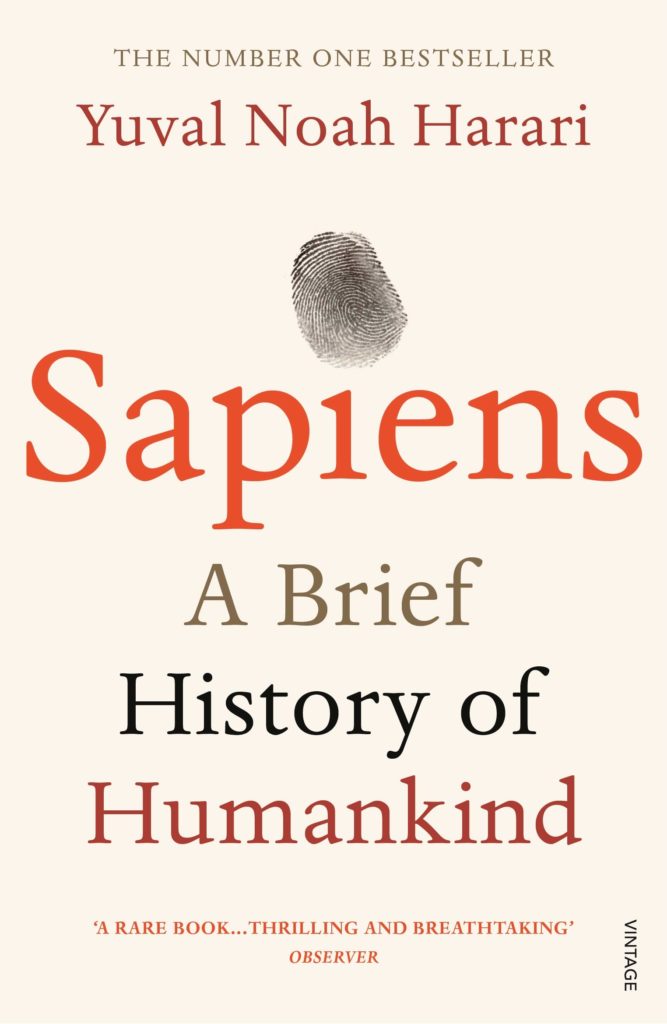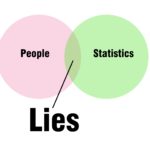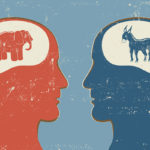
A brilliant book, I think Yuval is a master story-teller, to compress 100,000,000 year of human history into a single book with 500 pages is already an outstanding feat. Although I don’t think the book was a pure scientific book because he also discussed metaphysical things such as religion, belief, God, which is not empirically testable.
He started his book with the notion that we are not the only human, along with Sapiens, evolution gave us “cousins” such as Erectus, Denisova, and Neanderthals. But for some inconclusive reason or reasons, our cousins did not make it and become extinct, we, Sapiens, survived, thus our story begins.
Our first revolution that separate us from other species was the Cognitive Revolution. This is when we acquired the ability to communicate with each other in the form of language. But other animal communicate with each other too, what make ours different? Our cognitive ability enables us to talk about things that we cannot see, touched, and smell, or in other words, we can created fictional realities such as religion, nation, and tribe. This myth helps us do collective works of complex in nature with people we don’t intimately know. These collaboration abilities are what set us apart from other species. Yuval put 150 as a threshold for any collective to work properly, without a collective myth, beyond this threshold the group began to break. Our cognitive abilities to create a common myth in our collective minds enable us to surpass that threshold.
Starting with our ancestral forager, Yuval admitted that reconstructing the stories from this age is very difficult. Apart from no written record, the artefacts were very limited, most of the item used are woods which are perishable. People called it the Stone Age which to him was a mistake, it should be called the Wood Age, although few of these woods artefact survived under rare conditions. Ancient painting on cave’s wall also cannot help us tell their stories. These painting can be speculated on what does it symbolised, but the speculation did not give us a clue of what our ancestor if thinking, but rather it tells us the bias and the thinking of our scholars who tried to interpret them.
As Sapiens spread across the earth, to different continent and to remote islands, they (or we) did not spread in peace. The spread is accompanied by the extinction of other species. The first wave of extinction is when our forager ancestor spread. The second wave is during the agricultural revolution. The third wave and current one is the result of industrial revolution. Yuval rejected the motion that we co-exist with nature before the industrial revolution, as the matter of fact, we are the deadliest animal wreaking havoc on the ecosystem since our beginning. But he agreed that the scale of the third wave of extinction is unprecedented, whilst the first two only limited to animals on the land, our industrial adventures spared no one including the one that live deep in the oceans.
We often think that during the agricultural revolution, we domesticated plant such as wheat for our benefit. Yuval flip this over, instead, wheat domesticated Sapiens. Whilst we were forager, we enjoyed variety of food in our diet, our life is simpler, we hunt for food then we can do whatever we want. But after wheat domesticated Sapiens, we were put into houses and laboured day after day, tending and nurturing wheat, our diet become less varied, our lives turn more laborious. The agricultural society according to Yuval was a luxury trap, but once one tribe settled down, the others must follow suit or perished. Agriculture produced more food which help the tribe sustained large families, the tribe that did not settled will be easily outnumbered and defeated. Agricultural society is not a peaceful society, they are violent, but as they grew bigger so do the system of government, they transformed into kingdoms and the level of violence grew smaller.
In biological term, there is no creator, declared Yuval. People who adheres to any religion might feel restless a little bit reading this line of argument. Here I found that Yuval, take a same approach as Richard Dawkins, to use science and biology as a tool to advance atheism. Science on the other hand, should be neutral on the question of God, this is due to the mere fact that metaphysical argument is not testable by science. Science only can inform us with an objective reality back by empirical evidence. But there is no harm in reading his view, its a tempting and interesting just-so stories, because of this conflation, I don’t think the book is a pure scientific book.
One of the religion, criticized by Yuval was Humanism. The core doctrine of this religion is “follow your heart”. But human heart according to Yuval was a double agent, who always shaped by what we hear every day. So, our desire are easily manipulated by the bombardment of consumer advertisement, we ended up adhering to romantic consumerism – which is to fulfil our desire that was created by the media. This manipulation directed us indirectly to try different experience, and consuming the never-ending production of consumer goods. We buy things that we don’t need with money we don’t have, still we will not be fulfil because tomorrow there will be a different thing to try, different trend to follow, we will wake up tomorrow and chasing again.
When our agrarian culture transform village into kingdom, we face a mental limitation. Complex system of government needs to collect tax and store volumes of mathematical data about debt, income etc. These mathematical data cannot be stored even in the mind of the most intelligent man. Thus born a new system to store data, first known was by the Sumerians in the Mesopotamia, these advance system was called ‘writing’. The first recorded name in history belong to an accountant by the name of ‘Kushim’.
In defence of homosexuality, Yuval argue that what ever that is possible is biologically natural, in his view its culture that prohibit certain act, not biology. He went further saying that our understanding of what is “natural” and “un-natural” is coming not from biology, but from theology. From rational point of view, this opens up a wide range of possibilities, even criminal one. Thus, one can said that what Hitler does is biologically natural because it’s possible? He then painted a bleak picture of the purpose of existence. He went on saying that from purely evolutionary biological perspective our organ does not have any purpose, mouth for example are not only meant to eat, we use mouth to kiss, speak, or opening a pack of potato chips. But his argument contradicted with his own line, later when he tried to explain the evolution of organs, he said that the organ evolved to do “a particular function”.
In realm of political philosophy, Yuval argues that in our time, we try to reconcile the value of “equality” and “individual freedom”, these two, although regularly discussed in tandem, are two contradicting values. If you want to give people equality, you have to curtail individual freedom, for example by taxing the rich more we are curtailing his right to use his own money in whatever pursuit he sees fit. When we want to give people individual freedom, we have to sacrifice equality, the rich may have the freedom to use their own wealth for his individual desires, even if that means evicting poor families from his land. But Yuval noted that this contradiction is the engine of our culture, the debate sharpen our mind and excite us to be creative.
Analyzing the direction of history, Yuval noticed that there is the emergence of ‘world order’. Previously humans (or Sapiens) lived separately in their own world, with limited to non-existent relationship with others. But in macro perspective, these worlds united and begin to resemble a global order. Cultures blended, some diluted, some become dominant, culture become increasingly global in nature. Yuval pointed out three drivers for this unification. One is imperialism, that conquer other people and culture and treated them all equally as their subject. Second is the universal religion such as Islam and Christianity that break from local religion, they believe that all people share the same universal God. Third was capitalism, that work to unify the globe as a single market.
Discussing the role of imperialism, Yuval noted that there is no absolute good or bad in them, you can collect their crime and fill a book, you can also collect their benefit and fill another book. As imperialism has been in the world for a long time, many of what we have today are in fact is an imperial legacy. He pointed out that the culture of drinking tea in India, was never there until the British came. There were no ‘pure’ culture that does not have an influence from previous imperialism. If Indian nationalism want to have authentic culture and erased all what the British inherit to them, they will have to solve the culture that previous conqueror left, Taj Mahal for example was the work of Muslim Conqueror, as they go deeper and deeper, they will just have to defend one imperialism after another. Before the Muslim came there were Gupta Empire, before that Kushan Empire, the list goes on, so which one is the authentic one?
The Nazis were the product of Darwinian evolution logic. According to Yuval, the Nazis fought Communism and liberal humanism because they believed in natural selection, only the fittest should survive and reproduced. Other system which allowed the weak to thrived and reproduced will eventually pollute future human gene causing them to extinct.
Interestingly, the book also asked a question, why we studied history? The same question historian such as Howard Zinn once asked. For Yuval, history is not a means to predict the future, but to understand our present, why we were arranged in such a way, and to understand that in historical perspective, they can be alternative arrangement, that the social arrangement today is not natural, it is just a product of one historical possibility and there are a whole lot more possibilities that can be explored and realized.
Commenting on the progress of science, Yuval contended that science did not progress independently of politics, ideology or religion. Because there are many things that we can study, but which one is important and need to study first? This is not a scientific question, and need to be answered using ideology or religion. Furthermore our resources are limited, to fund a research study scientist need to justify them to government to get a grant, government of course will decide based on politics and his ideological leaning, again science will progress on path determined by ideologies.
The saddest part of history in book which I found was the wiping out of the natives of Tasmania, after 10,000 years of living in isolation, when the British came, they were wiped out systematically, to the last woman, man, and child. The British and their Christian missionaries tried to civilized and convert them, but they are not interested. The surviving natives became melancholic, lost interest in life, and chose death. Even after death, they are hunted, dissected, studied, and their corpses put in the museum. The last natives of Tasmania was a woman named Truganini.
There are many other interesting points in the book, but one I think, should receive a mention is this. Toward the end of the book, Yuval asked an interesting question, does the progression of history bring more happiness to human being? If not, what is the use of the French Revolution? If happiness can be achieved using biochemistry, why do we need ideologies and revolutions? We can consume prozac to increase our serotonin level. When discussing the meaning of life, Yuval wrote that happiness consist in seeing life as meaningful and worthwhile, there is cognitive and ethical component to happiness, and it depends on our values that we hold. Quoting Nietzsche, he wrote “if you have a why to live, you can bear almost any how”. And that should be the positive note to end this review.
Related Posts
Author of several books including Berfikir Tentang Pemikiran (2018), Lalang di Lautan Ideologi (2022), Dua Sayap Ilmu (2023), Resistance Sudah Berbunga (2024), Intelektual Yang Membosankan (2024), Homo Historikus (2024), DemokRasisma (2025), dan Dari Orientalisma Hingga ke Genosida (2025). Fathi write from his home at Sungai Petani, Kedah. He like to read, write and sleep.





